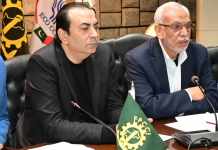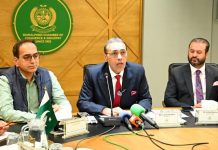KARACHI, JAN 13 /DNA/ – Governor, State Bank of Pakistan Mr. Jameel Ahmad reaffirmed the central bank’s dedication to increasing financial inclusion through strengthened collaborations with both global and domestic stakeholders. Mr. Ahmad shared these remarks in a bilateral meeting held with Chief Executive Officer of Alliance for Financial Inclusion (AFI), Dr. Alfred Hannig, during his visit to Pakistan on January 13, 2025, in Karachi.
In the meeting, Mr. Ahmad highlighted SBP’s recently launched 3rd edition of National Financial Inclusion Strategy (NFIS) 2024-28. He emphasized that SBP will persist in its efforts for enhancing financial inclusion through digitalization, and reduce the gender gap in finance.
Dr. Hannig extended AFI’s appreciation for SBP’s leadership role in promoting financial inclusion in Pakistan and discussed areas of mutual collaborations to continue efforts towards breaking the barriers. SBP is a founding member of AFI since 2008, which is a policy leadership alliance of central banks and financial regulatory institutions from 84 countries with the common objective of advancing financial inclusion at country, regional and international levels. SBP currently serves on AFI Board, and as Vice-Chair of AFI Gender Inclusive Finance Committee and the South Asia Regional Financial Inclusion Initiative (SARFII).
Governor Jameel Ahmad appreciated AFI’s support and its longstanding partnership with SBP, which facilitated in peer learning exchanges and capacity building opportunities for SBP officers in developing and implementing evidence-based financial inclusion policies. In his remarks, Dr. Hannig highlighted the crucial and progressive need to enhance regulators’ capacity in South Asia region to achieve impactful financial inclusion policy objectives, and stressed that the implementation should be balanced with effective cyber security resilience and consumer protection.
The meeting also explored opportunities to further strengthen institutional collaboration in areas of digital payments, financial literacy, sustainable finance and MSMEs financing. Both parties resolved to continue efforts for improving financial health and well-being of masses, especially of unbanked and underbanked population segments.
The SBP also organized a discussion of Dr. Hannig with financial inclusion stakeholders including the Presidents and CEOs of the banks, representatives Pakistan Bank’s Association, Pakistan Microfinance Network, Fintech Association & Network and SBP’s senior management. During this session, the NFIS 2024-28 was presented along with SBP’s financial inclusion goals for the next four years. An interactive discussion followed, where industry participants shared grassroots level insights and key challenges in broadening access to financial services, while AFI shared its perspective based on global best practices. The forum agreed to enhance collaborations among domestic stakeholders and international organizations for improved knowledge sharing on emerging trends in financial inclusion.
The visit concluded with a tour of the SBP Museum, where Dr. Hannig appreciated the cultural heritage, preservation of SBP’s history, and the evolution of Pakistan’s money over time.

















